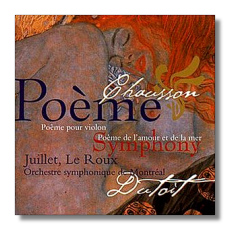
The Internet's Premier Classical Music Source
Related Links
- Chausson Reviews
- Latest Reviews
- More Reviews
-
By Composer
-
Collections
DVD & Blu-ray
Books
Concert Reviews
Articles/Interviews
Software
Audio
Search Amazon
Recommended Links
Site News
 CD Review
CD Review
Ernest Chausson

- Symphony in B Flat Major
- Poème
- Poème de l'amour et de la mer
Chantal Juillet, violin
François Le Roux, baritone
Montréal Symphony Orchestra/Charles Dutoit
Decca 458010-2 DDD 77:21
I've heard the Poème de l'amour et de la mer sung by a soprano (Victoria de los Angeles) and by two mezzo-sopranos (Janet Baker and Gladys Swarthout). This is the first time I've heard of a baritone singing it. It makes sense for a man to take it on, though; Bouchor's text is an address to something feminine, and it is unlikely that he and Chausson intended to rock the boat, as it were, with lesbian content. My research – limited to what I have lying around the house – sheds no light on whether Chausson sanctioned a baritone in this work; does anyone have any information pro or con? At any rate, Le Roux is a success. He sings like a youth with his heart in his throat. He replaces the plushness of Baker and the sustained gleam of de los Angeles with a more overtly dramatic plaint. Although this breaks the vocal line somewhat, it makes the singer into a sympathetic character, and not just a lighthouse pouring out beams of continuous tone. In short, Le Roux is very boyish and likeable, if not the final word in vocalism per se.
Actually, much the same can be said about violinist Chantal Juillet in her Poème. Just about everyone who can hold a fiddle has recorded this work, and I haven't heard a bad recording of it yet. Many violinists, however, interpret it as a virtuoso showpiece; it is no wonder that it frequently appears on disc with Ravel's Tzigane and with Saint-Saëns' Havanaise or Introduction and Rondo capriccioso, which all are enjoyable but rather surface-y works. Juillet's more intimate rendition is not lacking in rapture, and she rather cleverly holds back during the first part of the work to make its final climax more shattering… and it is shattering here. This is a very emotional work, and Juillet gives it its due with violin-playing that is less about technique than about French style.
It was a great idea to place Chausson's three most popular works on a single CD. I think there is no precedent for this. There have been a number of good recordings of the Symphony, which remains a somewhat elusive composition, sitting, as it does, in the shadow of Franck's sole symphony. In the stereo age, Charles Munch (with Boston) and Paul Paray (with Detroit) have stood the test of time – no wonder, as these were North America's best "French" orchestras of the era. Earlier, Pierre Monteux and the San Francisco Symphony did well by Chausson's symphony, as did Dimitri Mitropoulos with the Minneapolis Symphony Orchestra (studio recording) and the New York Philharmonic ("unofficial" recording). Now that Montréal is home to North America's best "French" orchestra, it is natural that the OSM and Dutoit should record Chausson's work; in fact, I am surprised that they waited so long. Dutoit's performance isn't as transparent as Munch's or Paray's, and the OSM's brass doesn't have the pleasantly nasal quality of the Boston Symphony Orchestra's. Dutoit makes all the right moves, although he is a little restrained. He seems to highlight the work's Wagnerian undertones, and to prefer mass to velocity. Even if this isn't the most preferable recording of Chausson's Symphony, the two accompanying works ensure that this CD will find its rightful place in listeners' collections.
Copyright © 2000, Raymond Tuttle


















